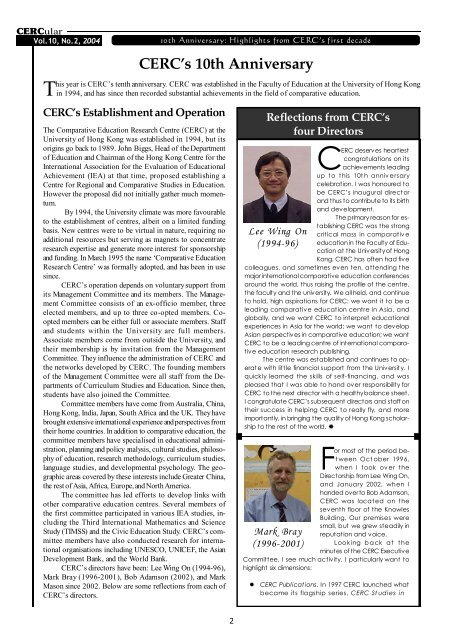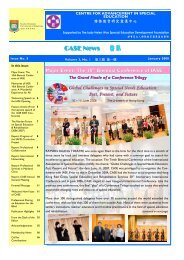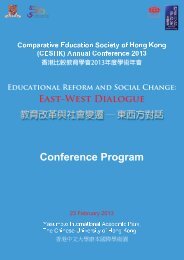C E R C u l a r - Faculty of Education - The University of Hong Kong
C E R C u l a r - Faculty of Education - The University of Hong Kong
C E R C u l a r - Faculty of Education - The University of Hong Kong
You also want an ePaper? Increase the reach of your titles
YUMPU automatically turns print PDFs into web optimized ePapers that Google loves.
CERCular<br />
Vol.10, No.2, 2004<br />
10th Anniversary: Highlights from CERC’s first decade<br />
CERC’s 10th Anniversary<br />
This year is CERC’s tenth anniversary. CERC was established in the <strong>Faculty</strong> <strong>of</strong> <strong>Education</strong> at the <strong>University</strong> <strong>of</strong> <strong>Hong</strong> <strong>Kong</strong><br />
in 1994, and has since then recorded substantial achievements in the field <strong>of</strong> comparative education.<br />
CERC’s Establishment and Operation<br />
<strong>The</strong> Comparative <strong>Education</strong> Research Centre (CERC) at the<br />
<strong>University</strong> <strong>of</strong> <strong>Hong</strong> <strong>Kong</strong> was established in 1994, but its<br />
origins go back to 1989. John Biggs, Head <strong>of</strong> the Department<br />
<strong>of</strong> <strong>Education</strong> and Chairman <strong>of</strong> the <strong>Hong</strong> <strong>Kong</strong> Centre for the<br />
International Association for the Evaluation <strong>of</strong> <strong>Education</strong>al<br />
Achievement (IEA) at that time, proposed establishing a<br />
Centre for Regional and Comparative Studies in <strong>Education</strong>.<br />
However the proposal did not initially gather much momentum.<br />
By 1994, the <strong>University</strong> climate was more favourable<br />
to the establishment <strong>of</strong> centres, albeit on a limited funding<br />
basis. New centres were to be virtual in nature, requiring no<br />
additional resources but serving as magnets to concentrate<br />
research expertise and generate more interest for sponsorship<br />
and funding. In March 1995 the name ‘Comparative <strong>Education</strong><br />
Research Centre’ was formally adopted, and has been in use<br />
since.<br />
CERC’s operation depends on voluntary support from<br />
its Management Committee and its members. <strong>The</strong> Management<br />
Committee consists <strong>of</strong> an ex-<strong>of</strong>ficio member, three<br />
elected members, and up to three co-opted members. Coopted<br />
members can be either full or associate members. Staff<br />
and students within the <strong>University</strong> are full members.<br />
Associate members come from outside the <strong>University</strong>, and<br />
their membership is by invitation from the Management<br />
Committee. <strong>The</strong>y influence the administration <strong>of</strong> CERC and<br />
the networks developed by CERC. <strong>The</strong> founding members<br />
<strong>of</strong> the Management Committee were all staff from the Departments<br />
<strong>of</strong> Curriculum Studies and <strong>Education</strong>. Since then,<br />
students have also joined the Committee.<br />
Committee members have come from Australia, China,<br />
<strong>Hong</strong> <strong>Kong</strong>, India, Japan, South Africa and the UK. <strong>The</strong>y have<br />
brought extensive international experience and perspectives from<br />
their home countries. In addition to comparative education, the<br />
committee members have specialised in educational administration,<br />
planning and policy analysis, cultural studies, philosophy<br />
<strong>of</strong> education, research methodology, curriculum studies,<br />
language studies, and developmental psychology. <strong>The</strong> geographic<br />
areas covered by these interests include Greater China,<br />
the rest <strong>of</strong> Asia, Africa, Europe, and North America.<br />
<strong>The</strong> committee has led efforts to develop links with<br />
other comparative education centres. Several members <strong>of</strong><br />
the first committee participated in various IEA studies, including<br />
the Third International Mathematics and Science<br />
Study (TIMSS) and the Civic <strong>Education</strong> Study. CERC’s committee<br />
members have also conducted research for international<br />
organisations including UNESCO, UNICEF, the Asian<br />
Development Bank, and the World Bank.<br />
CERC’s directors have been: Lee Wing On (1994-96),<br />
Mark Bray (1996-2001), Bob Adamson (2002), and Mark<br />
Mason since 2002. Below are some reflections from each <strong>of</strong><br />
CERC’s directors.<br />
2<br />
Reflections from CERC’s<br />
four Directors<br />
Lee Wing On<br />
(1994-96)<br />
Mark Bray<br />
(1996-2001)<br />
CERC deserves heartiest<br />
congratulations on its<br />
achievements leading<br />
up to this 10t h anniv ersary<br />
celebration. I was honoured to<br />
be CERC’s inaugural director<br />
and thus to contribute to its birth<br />
and development.<br />
<strong>The</strong> primary reason for establishing<br />
CERC was the strong<br />
critical mass in comparativ e<br />
education in the <strong>Faculty</strong> <strong>of</strong> <strong>Education</strong><br />
at the <strong>University</strong> <strong>of</strong> <strong>Hong</strong><br />
<strong>Kong</strong>. CERC has <strong>of</strong>ten had five<br />
colleagues, and sometimes even ten, attending the<br />
major international comparative education conferences<br />
around the world, thus raising the pr<strong>of</strong>ile <strong>of</strong> the centre,<br />
the faculty and the university. We all held, and continue<br />
to hold, high aspirations for CERC: we want it to be a<br />
leading comparative education centre in Asia, and<br />
globally, and we want CERC to interpret educational<br />
experiences in Asia for the world; we want to develop<br />
Asian perspectives in comparative education; we want<br />
CERC to be a leading centre <strong>of</strong> international comparative<br />
education research publishing.<br />
<strong>The</strong> centre was established and continues to operate<br />
with little financial support from the <strong>University</strong>. I<br />
quickly learned the skills <strong>of</strong> self-financing, and was<br />
pleased that I was able to hand over responsibility for<br />
CERC to the next director with a healthy balance sheet.<br />
I congratulate CERC’s subsequent directors and staff on<br />
their success in helping CERC to really fly, and more<br />
importantly, in bringing the quality <strong>of</strong> <strong>Hong</strong> <strong>Kong</strong> scholarship<br />
to the rest <strong>of</strong> the world. �<br />
For most <strong>of</strong> the period bet<br />
ween Oct ober 1996,<br />
when I took ov er the<br />
Directorship from Lee Wing On,<br />
and January 2002, when I<br />
handed over to Bob Adamson,<br />
CERC was located on the<br />
seventh floor <strong>of</strong> the Knowles<br />
Building. Our premises were<br />
small, but we grew steadily in<br />
reputation and voice.<br />
Looking back at the<br />
minutes <strong>of</strong> the CERC Executive<br />
Committee, I see much activity. I particularly want to<br />
highlight six dimensions:<br />
� CERC Publications. In 1997 CERC launched what<br />
became its flagship series, CERC St udies in

















